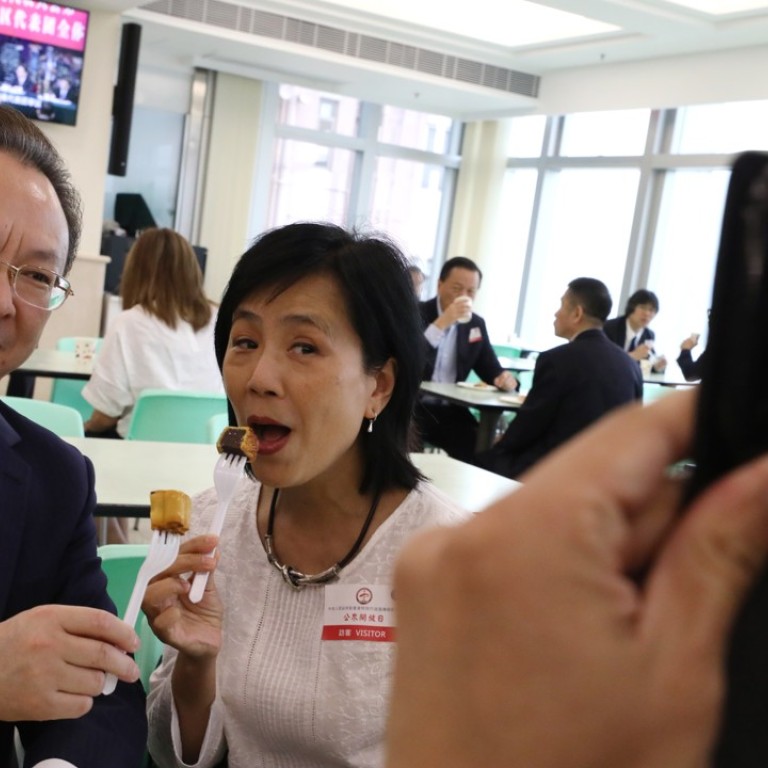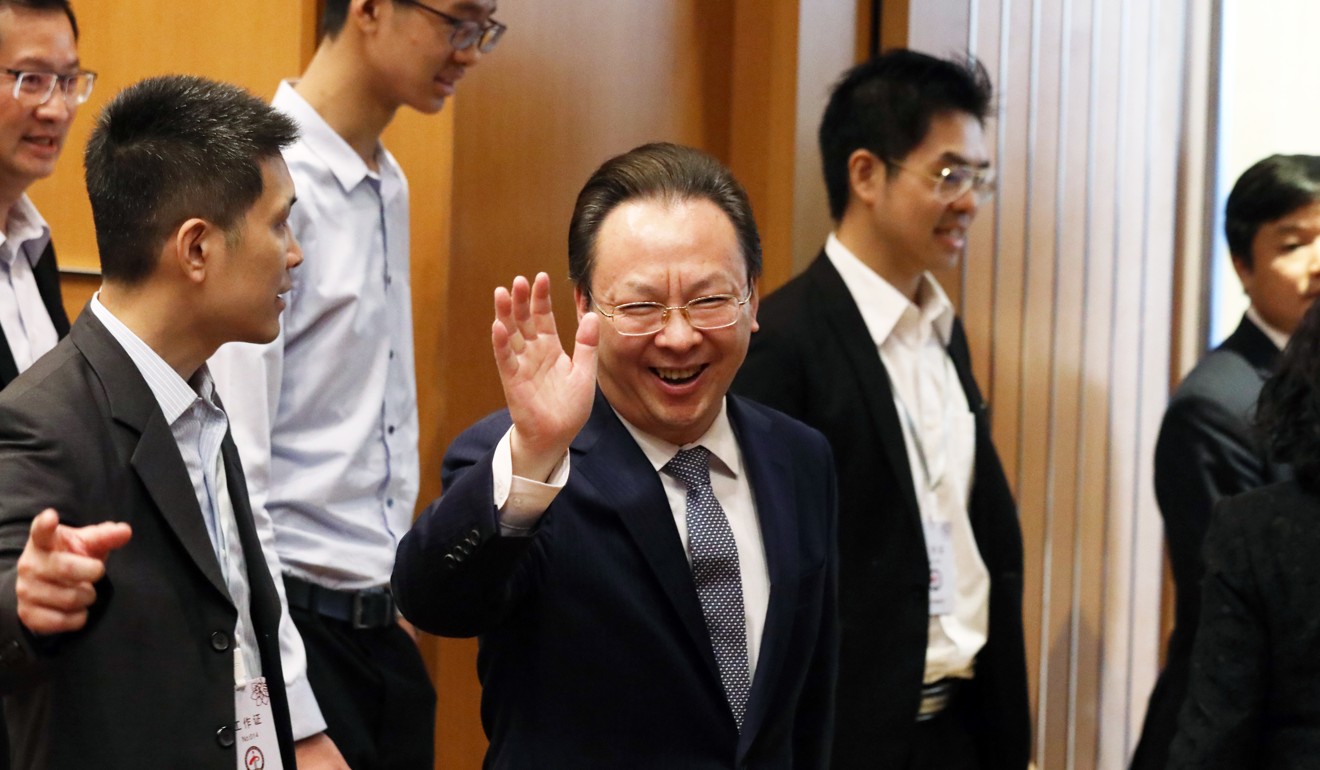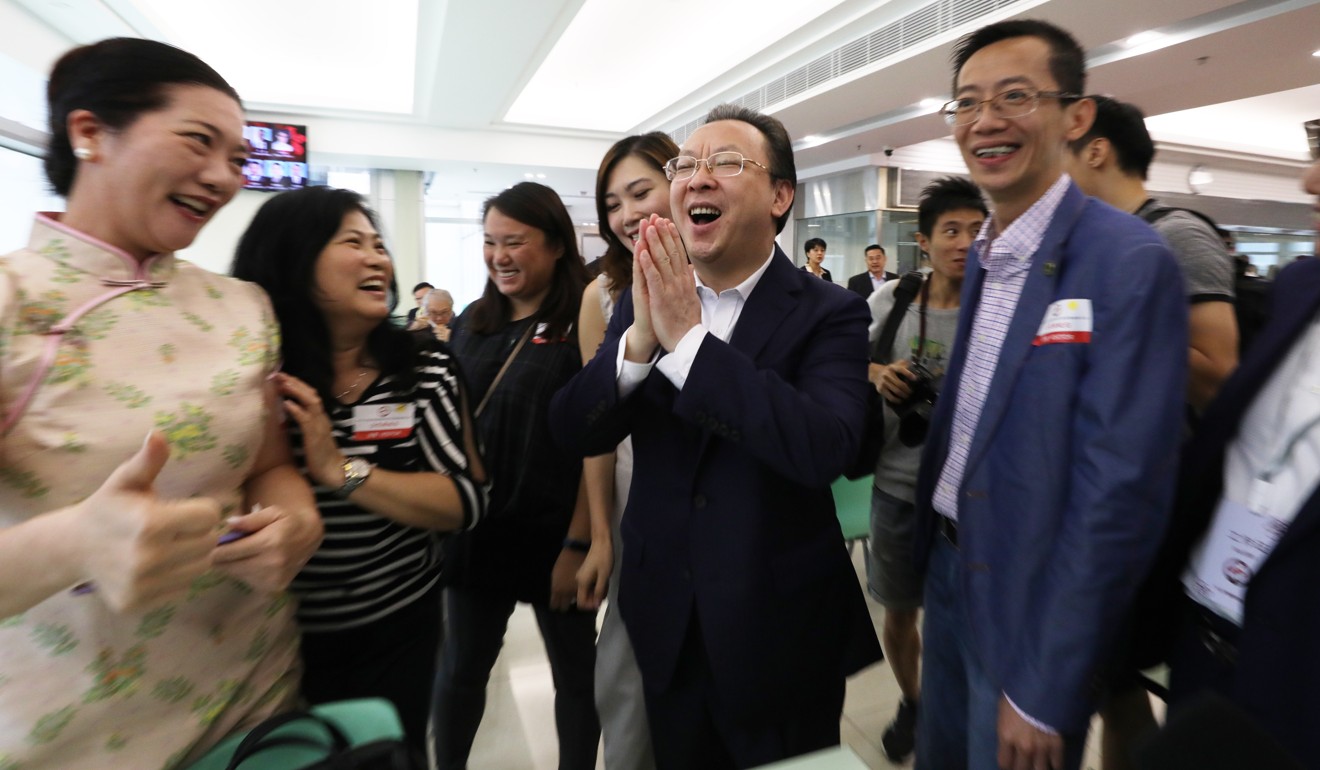
Hong Kong teachers urged to promote sense of ‘national identity’ in city students at liaison office open day
The deputy director of the central government liaison office in Hong Kong spoke to invited teachers and principals, saying he was pleased to see close ties between mainland and Hong Kong schools
A senior mainland envoy in Hong Kong has told the city’s teachers and principals to fulfil their mission in developing “a sense of national identity, a care for Hong Kong, and a global vision” in the younger generation so that they can become successors of “one country, two systems”.
Tan Tieniu, deputy director of the central government liaison office in Hong Kong, also said he was pleased to see closer ties between the Hong Kong and mainland school sectors in recent years, citing figures that about 100,000 Hong Kong students and teachers took part in exchange programmes and visited the mainland every year.
“Hong Kong’s education workers do have a good tradition of loving the country and loving Hong Kong,” said Tan, in an address at a ceremony to mark the second open day of the liaison office in Western on Sunday.

“I trust that our education workers will not fail to fulfil their mission and responsibility, and will continue to care and support the healthy development of Hong Kong’s young people, and develop in the new generation a sense of national identity, a care for Hong Kong, and a global vision,” he said.
In April, the office in Hong Kong held its first open day since its establishment in 2000, receiving some 1,500 visitors. Sunday’s event was exclusively for local teachers, headmasters, and parents. There were three two-hour sessions, with a total of 600 invited guests. Reporters were invited to cover the morning session.
Like last time, visitors were shown selected areas below the 10th floor of the building, including the lobby, recreation room, and drawing rooms. The tours concluded with a free meal in the staff canteen.
Will defining role of Beijing’s liaison office in the Basic Law ease society’s fears or ‘legitimise meddling’ in Hong Kong affairs?
Speaking to the press after the morning tour, Tan said: “Some people thought the liaison office was mysterious. There is nothing mysterious … We believe that with more interaction and communication, it can enhance the mutual trust and mutual understanding of the mainland and Hong Kong. And the society can become more harmonious.”
The exclusive tours for teachers came amid the recent calls for Hong Kong independence, especially in universities.
Earlier this month, Education University’s student leader Cheung Yam said at a ceremony to mark the start of the new academic year that “independence is the only way to build a place truly based on the interests of Hongkongers”.

In a reference to the mainland, Chinese University student union president Au Cheuk-hei also said at the university’s inauguration ceremony that they had a right to discuss the city’s sovereignty, especially amid the threats from a “northern empire”.
Langton Cheung Yung-pong, chairman of the Hong Kong Aided Primary School Heads Association, said after the morning tour that the open day was useful for them to get a better understanding of the daily work of the liaison office. “I hope to be able to bring back Tan’s messages to share with my fellow teachers and students,” said Cheung.
Beijing’s liaison office in Hong Kong dismisses ‘intervention’ claims at first open day event
He also said he hoped the liaison office could host open days for students in the future to arouse their awareness of China’s development. “Young people nowadays lack comprehensive understanding of Chinese history. When they talk about independence, they do not know how impractical it is.”
The office’s director Wang Zhimen suggested the idea of hosting open days biannually in February this year, saying the office was the Hong Kong people’s “old friend”. Wang, who previously headed the liaison office in Macau before being posted to Hong Kong, also held an unprecedented open day for the Macau office in July last year.
The liaison office in Hong Kong is the representative of the central government in the city.
British government sounds warning on freedom of speech in Hong Kong
Meanwhile, Tam Yiu-chung, Hong Kong’s sole delegate to China’s top legislative body, the National People’s Congress Standing Committee, said Hong Kong university students were “betraying Hongkongers” as they advocated the city’s independence from China.
Tam said: “Maybe it just proved that they don’t understand Chinese history, they don’t have any emotional [attachment towards China], and do not know the impact of what they said.”
“Hong Kong independence is not an issue of freedom of speech … Hong Kong is part of China, advocating the city’s independence means separating the nation’s territory, it’s betraying Hong Kong and its people,” Tam said on the TVB programme On the Record.
Pro-Beijing politicians and mainland officials had said that Hong Kong needs to enact national security legislation to curb independence advocacy, but Chief Executive Carrie Lam Cheng Yuet-ngor reiterated at a public forum organised by RTHK on Sunday that she would only enact national security legislation when the time is right.
“I have heard a lot of [people telling me] that the issues of national security and territorial integrity cannot be ignored ... [but I can only] do it when I know such work can possibly succeed, otherwise much energy would be wasted,” she said.
Under Article 23 of the Basic Law, Hong Kong’s mini-constitution, the city must pass national security legislation that criminalises acts such as treason, secession and sedition. But in 2003, the Hong Kong government’s draft bill of the Article 23 legislation was shelved after half a million people took to the streets to oppose it, saying it attacked Hongkongers’ freedom of speech and was ambiguous on what speech or actions could attract criminal liability.


